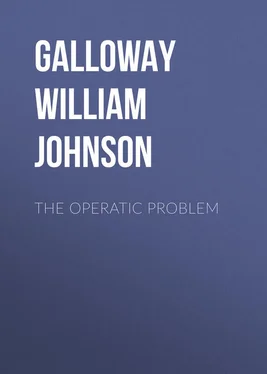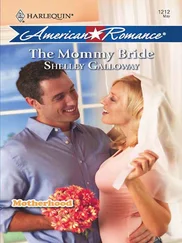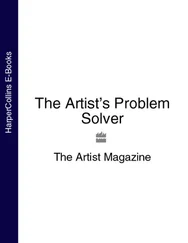William Galloway - The Operatic Problem
Здесь есть возможность читать онлайн «William Galloway - The Operatic Problem» — ознакомительный отрывок электронной книги совершенно бесплатно, а после прочтения отрывка купить полную версию. В некоторых случаях можно слушать аудио, скачать через торрент в формате fb2 и присутствует краткое содержание. Жанр: music_dancing, foreign_antique, foreign_prose, на английском языке. Описание произведения, (предисловие) а так же отзывы посетителей доступны на портале библиотеки ЛибКат.
- Название:The Operatic Problem
- Автор:
- Жанр:
- Год:неизвестен
- ISBN:нет данных
- Рейтинг книги:5 / 5. Голосов: 1
-
Избранное:Добавить в избранное
- Отзывы:
-
Ваша оценка:
- 100
- 1
- 2
- 3
- 4
- 5
The Operatic Problem: краткое содержание, описание и аннотация
Предлагаем к чтению аннотацию, описание, краткое содержание или предисловие (зависит от того, что написал сам автор книги «The Operatic Problem»). Если вы не нашли необходимую информацию о книге — напишите в комментариях, мы постараемся отыскать её.
The Operatic Problem — читать онлайн ознакомительный отрывок
Ниже представлен текст книги, разбитый по страницам. Система сохранения места последней прочитанной страницы, позволяет с удобством читать онлайн бесплатно книгу «The Operatic Problem», без необходимости каждый раз заново искать на чём Вы остановились. Поставьте закладку, и сможете в любой момент перейти на страницу, на которой закончили чтение.
Интервал:
Закладка:
William Johnson Galloway
The Operatic Problem
Last autumn, having to speak at an organ recital given by my friend Mr Clegg, I took the opportunity of giving what encouragement lay in my power, to the Corporation of my native town, in an endeavour they had made during the summer months to provide suitable music in the various parks throughout the city. To my great surprise that speech was quoted in journals, of all shades of opinion, in the country, and brought me also a vast correspondence.
A copy of the speech will be found at the end of this book.
As I have long desired that Opera should be placed within the reach of those, whose purses are not able to bear the strain of the high prices charged in England, and having some leisure before Parliament met this year, I made inquiries regarding the various systems of running Opera on the Continent of Europe. I obtained a vast mass of most interesting information. How to make the best use of that information was my difficulty. It was much too bulky to compress into the narrow limits of a magazine article, and besides, much of it had no peculiar interest for us in this country.
My chief desire was to put it before the public in a form that would arouse interest in the subject. Also, I realised that this information, however valuable, was like the desert, in its unwieldy form, and without any attempt to outline the conclusion to which it led. So after much trepidation of thought I determined to run the gauntlet and march right up to the cannon's mouth with a scheme of my own for the establishment of a system for National Opera in this country.
This little book is the result of my efforts, and though I do not pretend that it offers a complete solution of the question, still less that it gives a coup de grâce to the schemes of those who have trodden the same path before me, I do hope it may help to call into existence some plan for the foundation of Opera upon a popular basis.
To my critics – and many I shall have – I venture to say that, however much they disagree, they should remember I lay no claim to completeness, and I will gladly welcome any suggestions thrown out with a real desire to perfect my very imperfect ideas.
But there are two forms of criticism I wish to meet in advance.
The first is the criticism of those, who will say it is useless hoping to get public money for a luxury, whilst the nation is engaged in a costly war. I frankly and freely admit the force of such criticism, but I would urge in reply that a proposal like mine has far to travel, before it takes its final shape, and one cannot hope to get Parliament to take the matter up until the subject has been fully ventilated in the country. And although at such a time our first thoughts should be given to those who are fighting our battles in the field, surely no harm, and possibly much good, may come from considering how we can deal with the social problems which confront us.
The second form of criticism is perhaps more easily met, namely, the criticism of those who look upon all theatres and opera houses as vicious and contra bonos mores . This battle was fought by Molière in the seventeenth century. Prescott, in his delightful essay on Molière, tells us what difficulties that author had to face at the beginning of his career on these very grounds. The clergy, alarmed at the then rapidly-increasing taste for dramatic exhibitions, openly denounced the theatre as an insult to the Deity, and Molière's father anticipated in the calling his son had chosen no less his spiritual than his temporal perdition. Yet who is there to-day who will deny that Molière helped to correct the follies of his age, by exposing them to ridicule? And if in providing National Opera for the people, we can assist in the higher education of the community, we may well ask those who object on the grounds I have named, to remember that "there is no felicity upon earth which carries not its counterpoise of misfortunes," and that the evils they fear are not inherent only to the stage, but also exist in almost every other walk of life.
The Operatic Problem
Opera has, since its origin, been considered the highest form of theatrical pastime. The very appellation "opera" indicates that in the land of its birth it was looked upon as the "work" par excellence , and to this day it is the form of Art which is invariably honoured by exalted patronage, and one that people pay the most to enjoy. It is hardly necessary to advance documentary evidence in support of this assertion; moreover, it is beyond the scope of this book to marshal all the historical facts. My chief consideration will be to deal with the prospect of National Opera in England, and to take the existing state of things as the basis for future action. But some retrospect showing that the originators of opera understood its importance, and knew admirably how to define its scope, may prove interesting.
The following extract from the preface to Vitali's Aretusa , the score of which is in the Barberini Library, performed in Rome on the 8th of February 1620, is worth quoting in corroboration of the statement: —
"This style of work (opera) is a new style, born a few years ago at Florence, of the noble intelligence of Messer Ottavio Rinuccini, who, dearly beloved by the Muses and gifted with especial talent for the expression of passions, would have it that the power of music allied to poetry, tended rather to gather fresh strength from the combination, than to suffer diminution in consequence. He spoke of it to Signor Jacopo Corsi, Mæcenas of every merit and most enlightened amateur of music, proving that the mission of music united to poetry should be not to smother words with noises, but to help those words to a more eloquent expression of passion. Signor Corsi sent for Signor Jacopo Perri and Signor Giulio Caccini, eminent professors of singing and counterpoint, and after having discussed the subject, they came to the conclusion that they had found the means for reaching the desired goal. Nor were they mistaken. It is in this new musical style, the fable of Dafne to the poem of Signor Ottavio Rinuccini, was composed and performed in Florence at Signor Jacopo Corsi's, in the presence of the illustrious Cardinal del Monte, a Montalto, and their most serene Highnesses the Grand Duke and Grand Duchess of Tuscany. The work pleased them so much that they were absolutely bewildered ( attonitidi stupore ). This style of music acquired a still greater number of fresh beauties in Euridice , a work by the same authors, and then in Ariadne , by Signor Claudio Monteverdi, to-day Maestro di Capella at Venice ."
Your modern theorist could hardly express his operatic creed with greater felicity than the Florentine noble, Ottavio Rinuccini, and the whole quotation breathes in its quaint phraseology, the spirit of love for all that is new and beautiful in Art, which gave Italy her hegemony amongst other nations.
The operatic spectacle, when first imported into France, was a Court entertainment for the privileged few, but it soon tempted private enterprise, and here, again, its importance, as an attraction, was not underrated, for the first impressario , one Pierre Perrin, took good care to obtain a monopoly for the new style of performances, whilst the royal privilège (letters-patent), granted to him, sets out their advantages in unmistakable terms. 1 1 Here is an extract of this privilège : – "Nous avons au dit Perrin, accordé et octroyé, accordans et octroyons par les présentes signées de notre main la permission d'etablir en notre bonne ville de Paris et autres de nostrec Royaume, des Académies composées de tel nombre et qualité de personnes qu'il avisera, pour y représenter et chanter en public des opéra et représentations en musique et en vers français, pareilles et semblables à celles d'Italie. Et pour dédommager l'Exposant, des grands frais du'il conviendra faire pour les dites Représentations, tant pour les Théatres, Machines, Décorations, Habits qu'autres choses nécessaires; nous luy permettons de prendre du public telles sommes qu'il avisera et à cette fin d'etablir des gardes et autres gens nécessaires à la porte des lieux où se feront les dites Représentations; Faisant très expresses inhibitions et défences à toutes personnes de quelque qualité et condition qu'elles soient, mesme aux officiers de nostre Maison d'y entrer sans payer, et de faire chanter de pareils opéra ou Représentations en musique et en vers français dans toute l'entendue de nostre Royaume pendant douze années sans le consentement et permission du dit exposant, à peine de dix huit mil livres d'amende," etc., etc.
Интервал:
Закладка:
Похожие книги на «The Operatic Problem»
Представляем Вашему вниманию похожие книги на «The Operatic Problem» списком для выбора. Мы отобрали схожую по названию и смыслу литературу в надежде предоставить читателям больше вариантов отыскать новые, интересные, ещё непрочитанные произведения.
Обсуждение, отзывы о книге «The Operatic Problem» и просто собственные мнения читателей. Оставьте ваши комментарии, напишите, что Вы думаете о произведении, его смысле или главных героях. Укажите что конкретно понравилось, а что нет, и почему Вы так считаете.












